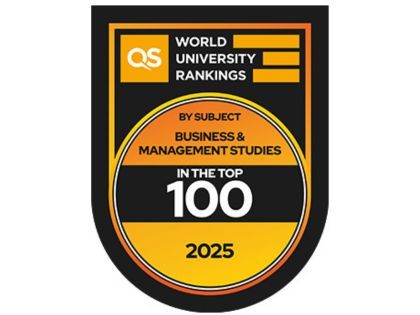
We live in a world where analytical decision-making happens every second. Data is collected about everything to construct, operate and maintain systems. If you want a career in data or business analytics, decision support, industrial engineering or management science, our MSc Business Analytics is ideal for you.
Full time 1 academic year
English

Lancaster University is ranked 13th in the UK and joint 99th globally for Business and Management according to the QS World Rankings by Subject 2025.

Our MSc Business Analytics covers a combination of technical skills, critical thinking skills and soft skills.
This programme will train you in analytical decision-making. Not only do you learn the theory of business analytics, but also how to apply it in practice. This involves generating relevant business insights using data-driven methodologies and tools. Our programme is one of the few to teach the entire business analytics life cycle, covering descriptive, predictive and prescriptive analytics.
You will enhance your programming in both R and Python, the two most popular languages in the areas of machine learning, statistics and data mining.
You will strengthen your skills in statistics, data analytics and visualisation. You will improve your problem structuring and problem solving. You will also hone your presentation, negotiation, and leadership skills.
All these skills enable you to develop the competence and confidence to contribute to the grand challenges faced by organisations.
Modules:
MSc Direct Entry
Academic:
2:2 Hons degree UK or equivalent.
Specific degree background is required: Completed degree with quantitative methods content (business, engineering, mathematics, sociology etc.)
For specific national curriculum, please view the website.
English:
IELTS 6.5 overall (no band below 6.0)
For other accepted English language tests, please view the website.
Pre-Master’s entry
Applicants who do not meet stated MSc direct entry requirements, may start with a Pre-Master’s programme. Please view full entry requirements here.
Teaching is delivered via a combination of small group lectures and group-based tutorial coursework (oral and written presentation), and assessment is via individual coursework (oral and written presentation) and examinations. You will be encouraged throughout to undertake independent study to supplement what is being taught/learnt and to broaden your personal knowledge.
All modules are delivered in a block teaching, allowing students to concentrate on each subject. All teaching is conducted in English.
German language skills are not required for admission into the programme. You will learn in English, and converse with classmates and academics in English.
All MSc Business Analytics students will receive their undergraduate degree from Lancaster University’s Bailrigg campus in the UK.
Our tuition fee is set for a 12-month time frame encompassing one academic year.
There are two types of fees at Lancaster University Leipzig:
The tuition fee that you will pay depends on your citizenship or your immigration status. International citizens with legal residence in the EU/UK or a EEA member country will be assessed for EU/UK fee status on a case by case basis. The admissions department will provide you with more guidance regarding the fee status review during the application assessment stage.
Eligible students may benefit from various funding options available at Lancaster University Leipzig. Explore what options you may be qualified for.
A Business Analytics degree can be widely applied across the business world. Our graduates at Lancaster University UK go on to work for a wide range of companies, large and small, around the world, in a variety of roles.
Recent graduate destinations include:
The roles our graduates have taken on include:
With data-driven decision-making now central to business success, the demand for professionals skilled in business analytics is rapidly rising across industries. MSc Business Analytics graduates are equipped with a powerful blend of analytical, technical, and strategic skills, enabling them to transform data into actionable insights. This makes them highly valuable in sectors such as finance, healthcare, retail, technology, and consulting. As organisations continue to invest in data capabilities, MSc Business Analytics graduates are exceptionally well-positioned to drive innovation and shape strategic decisions in an evolving business landscape.
For information on Careers Centre at LU Leipzig go to Careers Centre – Lancaster University Leipzig .
You want to deeply understand how businesses operate and make data-based decisions to optimise it? In only one year you will dive deep into all aspects, Dr Zajac, Assistant Professor in Business Analytics names in this video.